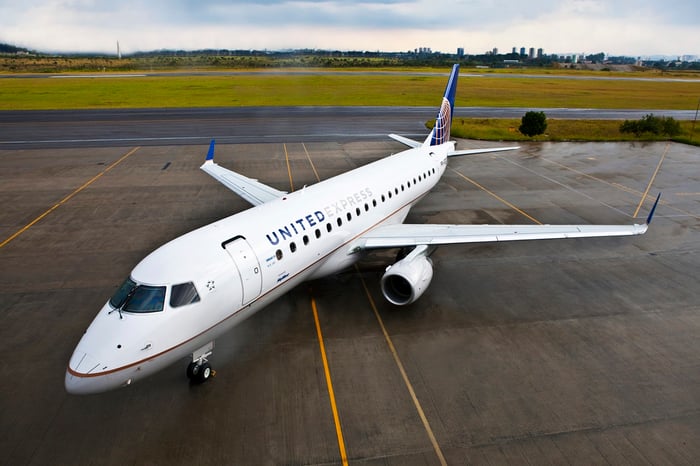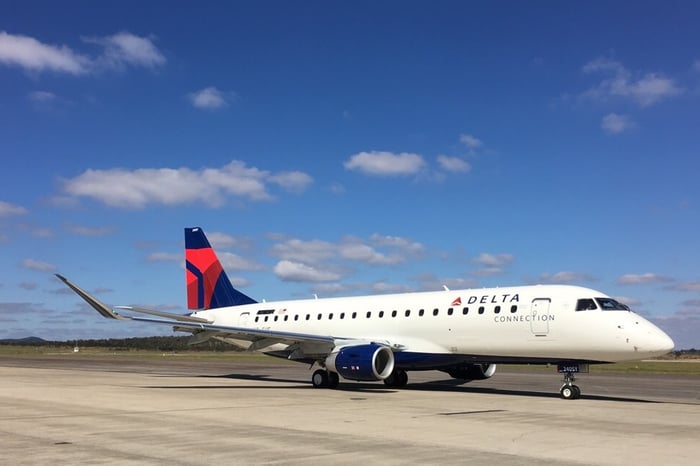Airline stocks have surged since the autumn as investors have gained confidence that the rapid development and distribution of coronavirus vaccines would tame the COVID-19 pandemic. In fact, many airlines now boast higher market capitalizations than they had in early 2020 -- even though their debt loads increased significantly during the pandemic and they are still ringing up big losses.
By contrast, SkyWest (SKYW -2.42%) nearly broke even in 2020 and has already returned to profitability. Moreover, its debt load decreased last year. Nevertheless, the airline's shares are still trading about 24% below their value at the beginning of 2020. That makes SkyWest stock a fantastic bargain.
Data by YCharts.
A safer business model
As a regional airline, SkyWest derives most of its revenue from fixed-fee agreements with big carriers like United Airlines. Under these arrangements, the major airline covers fuel costs and pays a fixed reimbursement for each flight operated. That protects it from the two major sources of volatility in the airline industry: fuel prices and the supply-demand balance.
SkyWest does operate some aircraft on a "prorate" basis, where it receives a portion of the revenue generated by the passengers on those flights -- and is therefore exposed to more risk. However, as of March 31, 401 of its 468 aircraft in scheduled service were flying under fixed-fee contracts.
The pandemic still hurt the airline because its larger partners didn't need as many regional flights as they previously had. Yet SkyWest's business model insulated it from the worst of the downturn. As a result, the company posted a modest pre-tax loss of just $7 million last year.
Business is snapping back
Domestic air travel demand has made a significant (though certainly not full) recovery during 2021. As a result, SkyWest's partners are ramping up their regional schedules. Indeed, regional flying -- particularly on Embraer E175 jets -- is the most cost-effective way for major airlines to rebuild their route networks. The E175 can fly further than most regional jets and offers amenities comparable to mainline aircraft. Most importantly, regional airline pilots are typically paid less than half as much as their mainline counterparts.

Image source: United Airlines.
Management estimates that flying volumes will rebound to 2019 levels by the fourth quarter. With many airlines reporting abundant demand for summer leisure travel, SkyWest might even get back to its 2019 flight volumes in the third quarter.
The airline reported a solid profit of $0.71 per share for the first quarter, despite a 23% year-over-year decline in block hours. (This did include a benefit from payroll support grants.) With flying set to ramp up rapidly over the next few quarters, SkyWest's revenue and profitability are positioned for swift recoveries from the pandemic.
Solid growth prospects
Several U.S. regional airlines shut down last year due to the pandemic's impact and the changing fleet requirements of their mainline partners. As the largest U.S. regional airline, SkyWest has a great opportunity to gain market share as its partners rebuild their regional jet operations (and expand, in some cases).
Earlier this month, Alaska Airlines selected SkyWest to operate eight additional E175s starting next year. SkyWest also has contracts to add 16 CRJ700s and 20 E175s for American Airlines over the next year or so. Importantly, these deals will further diversify its revenue away from top partners United Airlines and Delta Air Lines.

Image source: SkyWest.
By the end of 2022, SkyWest will operate at least 221 E175s -- up more than 40% from the 156 it had at the end of 2019. The growth of this high-margin fleet type will likely propel the company's revenue and earnings beyond their 2019 levels by 2023.
A bargain in plain sight
SkyWest stock has recently traded for around 8 times the company's 2019 adjusted earnings per share of $6.25. This is an incredibly low valuation considering its growth prospects and comparatively low-risk business model relative to other airlines.
Furthermore, the airline ended last quarter with net debt of $2.27 billion, down by about $200 million from the end of 2019. That's a very manageable amount compared to its pre-pandemic earnings before interest, taxes, depreciation, and amortization (EBITDA) of more than $850 million. Between its growth opportunities, rock-bottom valuation, and solid balance sheet, SkyWest stock looks like one of the biggest bargains in the stock market today.






